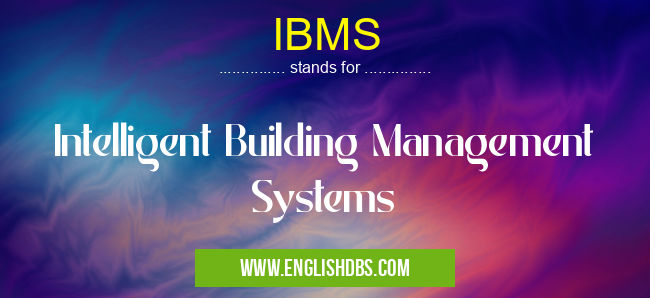What does IBMS mean in MANAGEMENT
IBMS stands for Intelligent Building Management Systems. These systems are designed to optimize the performance and efficiency of buildings by automating and integrating various building systems. IBMS combines hardware, software, and communication technologies to provide real-time monitoring, control, and optimization of building operations.

IBMS meaning in Management in Business
IBMS mostly used in an acronym Management in Category Business that means Intelligent Building Management Systems
Shorthand: IBMS,
Full Form: Intelligent Building Management Systems
For more information of "Intelligent Building Management Systems", see the section below.
» Business » Management
Key Features of IBMS
- Centralized Monitoring: IBMS provides a single platform to monitor all aspects of a building's operations, including HVAC, lighting, security, and energy consumption.
- Automated Control: IBMS can automatically adjust building systems based on predefined parameters, such as temperature, occupancy, and energy efficiency.
- Data Analytics: IBMS collects and analyzes data from various sensors and devices to identify trends, optimize performance, and detect potential issues.
- Remote Access: IBMS allows authorized personnel to remotely access and control building systems from anywhere with an internet connection.
Benefits of IBMS
- Improved Energy Efficiency: By optimizing HVAC and lighting systems, IBMS can reduce energy consumption and operating costs.
- Enhanced Comfort and Safety: IBMS can improve the comfort and safety of building occupants by providing real-time monitoring of temperature, humidity, and security systems.
- Reduced Maintenance Costs: IBMS can proactively identify potential issues and alert maintenance personnel, reducing the likelihood of costly repairs.
- Increased Operational Efficiency: IBMS automates routine tasks, freeing up facility managers to focus on more strategic initiatives.
Essential Questions and Answers on Intelligent Building Management Systems in "BUSINESS»MANAGEMENT"
What are Intelligent Building Management Systems (IBMS)?
IBMS are advanced systems that use technology to integrate and automate various building functions, such as HVAC, lighting, security, and energy management. They centralize control and monitoring, optimizing building performance, reducing operating costs, and enhancing occupant comfort.
What are the benefits of implementing an IBMS?
IBMS offer numerous benefits, including:
- Energy efficiency and cost savings
- Enhanced occupant comfort and productivity
- Improved building security
- Streamlined maintenance and operations
- Reduced carbon footprint and sustainability
- Predictive analytics and data-driven decision-making
How does an IBMS work?
IBMS operate by connecting various sensors, actuators, and controllers throughout the building to a central platform. This platform collects and analyzes data from multiple systems, allowing for automated control and optimization. Advanced algorithms and machine learning enable the system to continuously learn and adapt to building conditions, improving performance over time.
What are the different types of IBMS?
IBMS can be classified based on their functionality and scale:
- Basic IBMS: Focus on a single function, such as HVAC control.
- Integrated IBMS: Integrate multiple building systems, providing a centralized view and control.
- Enterprise IBMS: Comprehensive systems that cover all aspects of building management, including asset management and energy optimization.
Who can benefit from an IBMS?
IBMS are suitable for a wide range of buildings, including:
- Commercial offices
- Educational institutions
- Healthcare facilities
- Hospitality and tourism
- Retail and entertainment complexes
- Industrial and manufacturing plants
Final Words: IBMS plays a crucial role in the modern building landscape. These systems provide comprehensive and integrated management solutions, enabling building owners and operators to optimize efficiency, enhance occupant comfort and safety, and reduce operating costs. By leveraging advancements in technology and data analytics, IBMS continues to transform the way buildings are managed, leading to a more sustainable and cost-effective built environment.
